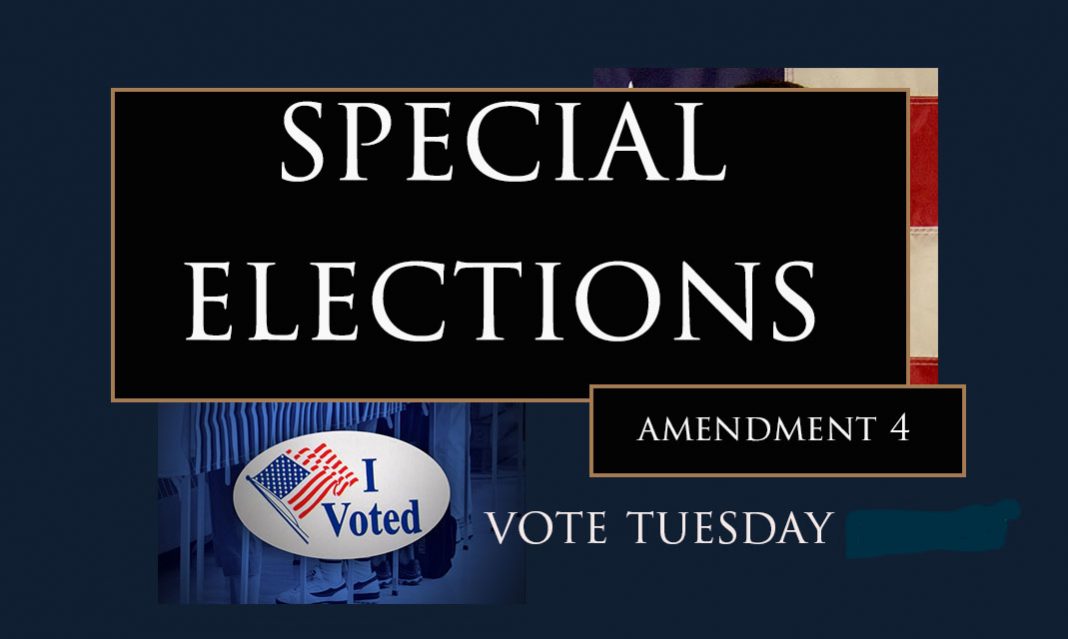Alabama voters will go to the polls on November 6. In addition to the general election there are four (4) important Constitutional Amendments that will appear at the end of the ballot. These amendments should be studied in advance of election day to be sure that you understand the effect of your voting choice – yes or no .
Please take the time to study these amendments before you vote.
 According to the Alabama Policy Institute:
According to the Alabama Policy Institute:
“This amendment addresses something Alabamians have been hearing about for a while now–special elections. It is important to note on the front end, however, that it does not address special elections for the U.S. Congress like that of 2017. Instead, it impacts vacancies in the state legislature.
If accepted, legislative vacancies that occur on or after October 1 of the third year of a quadrennium (in other words, seats that become open only months before the final session of the legislature’s four-year term) would remain vacant until the next general election.
Currently, the governor is required to schedule a special election when state legislative vacancies occur. These elections cost the state money, create voter fatigue, and according to Senator Glover, the amendment’s sponsor, are “just bad government.”
In an interview with API, Senator Glover described one case where, thanks to a late special election, a legislator was sworn in on the last day of session. Cases like these, where relatively powerless legislators are added to the state payroll, will not occur if the amendment is approved.
The main purpose, according to Glover, is to “save some money and confusion.” He estimates that, if this language had been on the books earlier, the state would’ve saved “just under a million dollars” in 2018 alone. For example, this amendment would prohibit what will, come November, be four separate elections for Alabama’s 26 Senate seat in less than a year.
Additionally, the amendment received unanimous support when it passed the Senate and overwhelming support in the House earlier this year.”

The following is provided from the Alabama Secretary of State John H. Merrill’s Office and the Fair Ballot Commission:
BALLOT STATEMENT FOR STATEWIDE AMENDMENT #4
(1) The text of the statewide ballot measure, including sponsors, cosponsors, and the text of the question that will appear on the statewide ballot:
Proposed by: Act 2018-276 (Senate Bill 15 of the 2018 Regular Legislative Session)
Bill Sponsor: Senator Glover
Cosponsors: None
“Proposing an amendment to the Constitution of Alabama of 1901, to provide that, if a vacancy in either the House of Representatives or the Senate occurs on or after October 1 of the third year of a quadrennium, the seat would remain vacant until a successor is elected at the next succeeding general election.
Proposed by Act 2018-276.
This description shall be followed by the following language:
Yes ( ) No ( )”
(2) A summary of and the text of any implementing legislation directly related to the statewide ballot measure:
There is no implementing legislation for this statewide ballot measure.
(3) The placement of the statewide ballot measure on the statewide ballot:
This proposed Constitutional Amendment will appear on the Ballot after election of statewide and local offices and will be the fourth constitutional amendment for voter consideration. The proposed Constitutional Amendment will be listed as “Statewide Amendment 4“.
(4) A plain language summary of the statewide ballot measure, which shall include, at a minimum, the legal or constitutional authority for its passage, the effect of the statewide ballot measure if it is passed, including its cost and source of funding, and the effect of the statewide ballot measure if it is defeated.
Under current law, members of the state legislature are elected to four-year terms of office that begin and end on Election Day in November. This four-year period is known as a quadrennium. When a person who was elected to serve in the state legislature is unable to complete his or her term, a vacancy is created. When this vacancy occurs, the Governor is required to schedule a special election. The winner of the special election fills the vacancy for the rest of the term.
Amendment 4 provides that when a vacancy occurs in the state legislature on or after October 1 of year three of the four-year term, the seat will remain vacant until the next general election, which occurs in November of the fourth year of the term. The Governor would no longer have the power to schedule a special election to fill a vacancy in these circumstances, and public funds that would have been spent on the special election would be saved.
A VOTE OF YES WILL HAVE THE FOLLOWING EFFECT:
If a majority of voters vote “Yes” on Amendment 4, state legislative seats that become vacant within the final 14 months of the four-year term of office will remain vacant until the general election.
A VOTE OF NO WILL HAVE THE FOLLOWING EFFECT:
If a majority of voters vote “No” on Amendment 4, the Governor will continue to be required to schedule a special election whenever a vacancy occurs in the state legislature.
There is no cost for Amendment 4.
The Constitutional authority for passage of Amendment 4 is set forth in Sections 284, 285 and 287 of the State Constitution. These sections outline the way a constitutional amendment may be put to the people of the State for a vote.
















